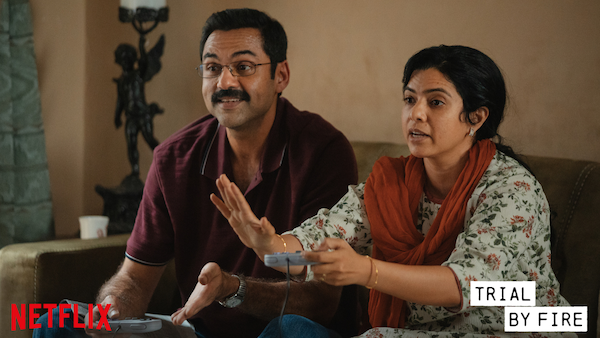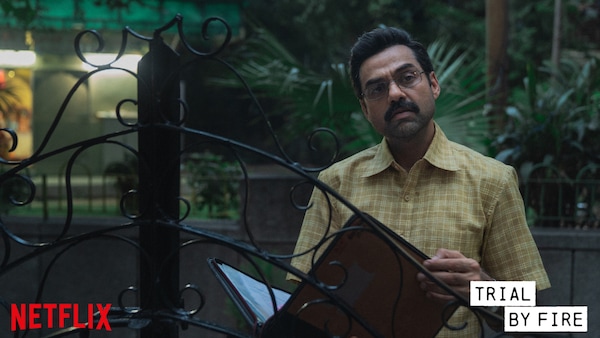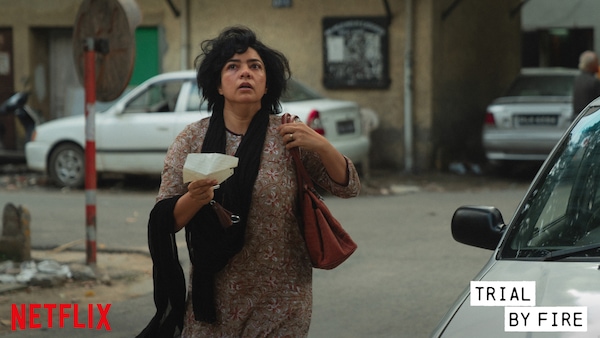Trial By Fire review: Rajshri Deshpande is compelling as the wounded mother with a steely determination
Trial By Fire delivers as a taut investigative and courtroom drama that is equally heartbreaking and inspiring

Last Updated: 05.02 PM, Jan 13, 2023
Story: The series follows the 25-year-long legal battle that ensues as an aftermath of the Uphar Cinema fire in Delhi in 1997 that claimed 59 lives and rendered over a 100 injured. The series revolves around a middle-class couple who lose both their teenage children to the accident and decide to take the legal route to seek justice.
Review: Shows that dramatise real-life accidents with devastating consequences tend to take a singular approach. Cobbling together facts pertaining to the event, they clinically examine the factors that led to the debacle and assess the ramifications incurred. Based on the book Trial by Fire: The Tragic Tale of the Uphaar Fire Tragedy, this compelling drama hopes to break this mould.

The series speedily establishes the setting in the opening scene. Neelam (Rajshri Deshpande) and Shekhar Krishnamoorthy (Abhay Deol) and their teenage son and daughter complete the idyllic portrait of an average middle-class family from South Delhi. A weary mom struggles to keep up with the moody teens while the father (like most) points out that she’ll miss the bustle of their tantrums once they’re gone. He obviously means when they leave the nest. But what follows takes a morbidly literal turn. In the very next scene, the news of the fire at Uphar Cinema blazes through the city, and the Krishnamoorthys find their worst fears realised as their children succumb to the accident. What follows plays out like an investigative drama as the Krishnamoorthys collaborate with victims’ relatives to pin those accountable for the accident. Neelam takes the lead here, running through reports, witness accounts and disturbing news footage of victims being lugged out of the cinema hall by firefighters like sacks of grain, hoping to chance upon a break. Taking on the cinema owners, who also happen to be one of the wealthiest industrialists in the country, with limited resources, elevates this into an incredible duel. The legal battle that ensues extends over decades but the retribution at the end, while hardly commensurate to the crime, makes a compelling case for persistence and renders a series worth sitting through.

What sets Trial By Fire apart from most in the genre is that it closely sensitises the audience about how the bereaved parents must feel when the accused refuse to take accountability and blatantly dismiss the incident and shift the blame on the local authorities. What the parents go through is a quiet expression of grief, devoid of any chest beating or histrionics. The setback of losing one’s children to a horrific accident can result in severe shock and processing it can only happen in increments, over time. The series considers this in every frame and through the course of the show, we’re only intermittently reminded of the incomparable loss that this couple has endured. That they put up an opaque exterior to the world could also be interpreted as a deliberate attempt to keep it together as crumbling under its weight could only derail the process of seeking justice.

However, there’s a decisive point in the show when the Krishnamoorthys are visibly livid and it’s also when their plan of seeking retribution is wordlessly crystallised. They chance upon a commercial aired by the accused, advertising their first shopping mall which features an idyllic family of four washed by the prospect of a first-world life. While unintentional, given the circumstances, it almost feels as if the audiovisual was meant to mock the mourning parents and also drive home the message that they had moved on from the tragedy without a scratch.

Deshpande is the undisputed star of Trial By Fire. Infusing her Neelam with a wounded yet steely determination, she carves a mother who’s unwilling to accept her fate and strives for justice, albeit belated. Her appearance often belies her relentless, unwavering intensity in manoeuvring the challenges she encounters. Even Deol as the conflicted father struggling to move on from the tragedy, packs a punch, even while his role here seems to be decidedly secondary. The supporting cast includes heavy lifters such as Ratna Pathak Shah, Ashish Vidyarthi, Anupam Kher, Rajesh Tailang (Delhi Crime) and Shardul Bharadwaj (Eeb Allay Ooo!) and each of them pulls through with conviction.

Directors Prashant Nair and Randeep Jha ensure the narrative is consistently taut. In this process, they lean heavily on tropes by injecting the screenplay with chase sequences, conflicts, confrontations and peripheral plot points that drum up tension and keep the audiences unsettled throughout the series. Adopting an anthology-style framework where parallel stories circumvent at multiple points allows one a break from the legal drama and also take in the same story through multiple perspectives. It is evident that while the fate of those trapped in the cinema hall was equally devastating irrespective of their privilege, the life of their surviving next of kin differs dramatically based on their circumstances.

Verdict: Adaptations invite obvious comparisons. But this retelling manages to effectively realise the situations and hopefully, the emotions that the show’s lead couple endure in their 25-year-long battle to seek retribution.
WHERE
TO WATCH
Subscribe to our newsletter for top content, delivered fast.

